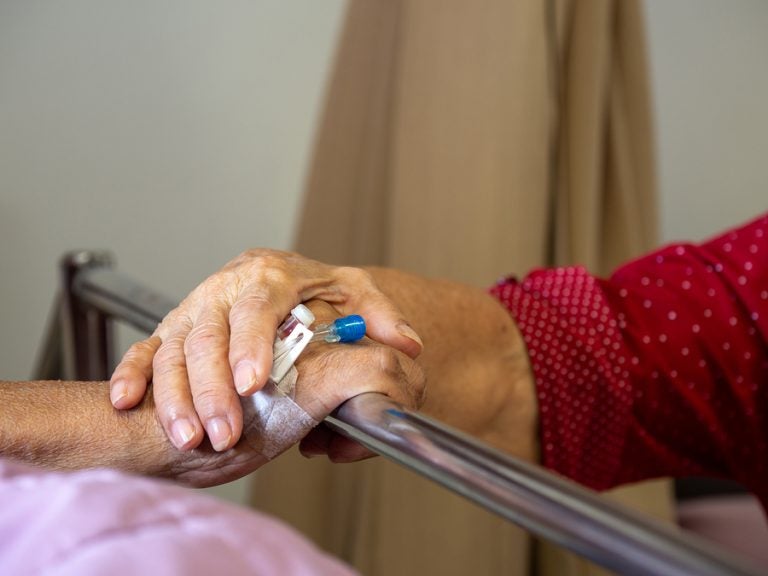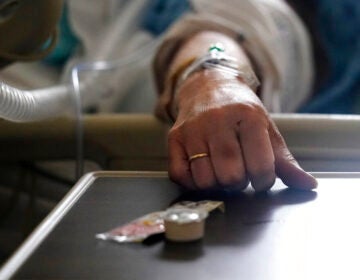N.J. terminally ill patients can now legally end their lives with medical help
New Jersey is now the eighth state, plus the District of Columbia, to allow terminally ill patients to acquire lethal medication to end their lives.

New Jersey's aid-in-dying legislation for terminally ill patients takes effect August 1. (Bigstock)
New Jersey is now the eighth state to allow terminally ill patients to acquire lethal medication to end their lives.
The state’s contentious “Medical Aid in Dying for the Terminally Ill Act” took effect on Thursday. Supporters say it will offer sick patients the chance to end their suffering on their own terms, while opponents say some people will now face pressure to die from family members and insurance companies.
One Catholic bishop in New Jersey called the law a “moral evil.”
Catholic hospitals will not participate in the law, but physicians at other institutions said they are ready to have conversations with patients about the new option.
“We have names of physicians that are willing to be prescribers, we have names of physicians that are willing to be just consultants, we have the pharmacy just about on board,” said Deborah Pasik, a Morristown-based rheumatologist who is part of Atlantic Health System. “All of the pieces are in place.”
Matt Whitaker of Compassion & Choices, a national organization that advocates for and helps implement such laws, said he expects the number of people who use the law will start low and ramp up over time.
Many health care systems, like Cooper University and AtlantiCare in South Jersey, are still finalizing internal policies, while state officials published guidance for patients and health care facilities only Wednesday.
In other states that have legalized the practice, it took time for patients and doctors to become comfortable with the option. In Oregon, the first state to allow the practice, 249 people received prescriptions for lethal medications last year, up from 24 in 1998, according to state data.
“I suspect that in New Jersey, similarly, it won’t be that hospitals and hospices are flooded with requests on Aug. 1, but rather that this will be a conversation that will begin to take place in the course of regular medical care,” Whitaker said.
How the new law works
Under the law, terminally ill adults living in New Jersey who are deemed mentally “capable” will be able to request and then use a prescription for lethal medication.
Two physicians will be required to attest that the person has less than six months to live. The patient will then have to make two oral requests and one written request for the medication over a period of at least 15 days. During that time, doctors must discuss alternative treatment opportunities, such as palliative and hospice care, and offer patients a chance to rescind their request.
Patients who do choose to take the medicine must administer it to themselves. Cancer has been the most common underlying illness faced by people using similar laws in other states, followed by neurological, respiratory, and cardiovascular diseases.
Matthew Suh, a surgeon based in Sussex County who is among the most vocal opponents of the new law, said Thursday was “a sad day to be a physician in New Jersey.”
“Assisted suicide deeply undermines the physician/patient relationship and runs counter to the physician’s oath as a healer,” he said in a statement.
He also touched on a fear among disability rights advocates and others that such a law will encourage insurance companies to pressure people toward a hastened death, rather than cover conditions that are expensive to treat.
“This law is a dangerous public policy that puts groups who already struggle to equally access our health care system at great risk, including the elderly, the poor, and people with disabilities,” Suh said.
The Catholic Church, meanwhile, objects on a moral basis. Bishop James Checchio of Metuchen issued a statement this week that “assisted suicide is a grievous affront to the dignity of human life and can never be morally justified.”
“Passage of this law points to the utter failure of government, and indeed all society, to care truly, authentically, and humanely for the suffering and vulnerable in our midst,” he said.
Catholic ethical directives say that “Catholic health care institutions may never condone or participate in euthanasia or assisted suicide in any way.” That applies to Virtua Our Lady of Lourdes Hospital in Camden and to St. Francis Medical Center in Trenton, according to the New Jersey Catholic Conference. It does not apply to Virtua Willingboro Hospital, which is not bound by the Catholic ethical directives, according to a Virtua spokesman.
Patrick Brannigan, executive director of the New Jersey Catholic Conference, said the directives also apply to doctors employed by a Catholic entity and those who have privileges at a Catholic entity when they are practicing there.
“There is no way that a Catholic entity can control the activities of a doctor who is not an employee in that doctor’s private practice,” Brannigan said.
Despite the impassioned objections by some, laws to provide terminally ill patients with access to lethal medication have gained support among state lawmakers in recent years.
Oregon was the first to approve such a measure, in 1994, followed by Washington more than a decade later, in 2008. Since 2013, though, six states have legalized the practice, including New Jersey in April and Maine in June. The others are Vermont, California, Colorado, and Hawaii.
Montana does not have a statute permitting the practice, but a 2009 state Supreme Court ruling said state law protects doctors from prosecution for helping terminally ill patients die.
In theory, people from other states can now travel to New Jersey to use the law.
Under the New Jersey measure, patients must be residents, which they can prove by showing a doctor their driver’s license or non-driver ID card, proof they are registered to vote in New Jersey, a resident income tax return or “any other government record” that demonstrates residency.
Kevin Roster, a 36-year-old poker player and business owner who suffered from terminal sarcoma, traveled from New Jersey to California in May to use that state’s law before the one in New Jersey took effect. He died Friday after taking lethal medication.
—
Editor’s note: This story has been updated to reflect that Virtua Willingboro Hospital is not bound by the Catholic ethical directives.
WHYY is your source for fact-based, in-depth journalism and information. As a nonprofit organization, we rely on financial support from readers like you. Please give today.





